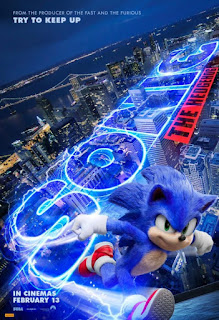Colossal (Dir. Nacho Vigalondo, 1h 50m)
The monster movie, not unlike the zombie movie, is rarely simply an excuse to watch various cities get smashed up in epic style by a solitary (or warring factions of) towering creature, robot or being from another dimension. Godzilla in his many outings both in Japan and in the West, for example, has carried everything from an anti-nuclear to an anti-Imperialist message, whilst Cloverfield echoes the fear and verité camcorder reportage of terrorist attacks on the West, particularly in America. Colossal is no different, and in its mix of darkly funny slacker inaction and its giant monster battles, it tells the story of a recovering alcoholic, and her quite literal battles with both the bottle and those who take solace in it.
Colossal is fairly typical of its director, Nacho Vigalondo's style; whilst he's been described with such glowing terms as the "Woody Allen of science-fiction", his films tend to put a twist on the typical science fiction tropes (for example, his second film, Extraterrestre is a deliberate inversion of the "plot following the protagonist" style of many disaster/monster movies, with our heroes essentially trying to live normal lives with an alien ship above their city), and indeed tend to be more bleakly funny than Allen's work. What is also obvious is that Vigalondo absolutely adores giant monsters, and kaiju in particular-much like Del Toro, there is a huge sense of love for the entire tokusatsu (literally Japanese for "special filming"-think Godzilla, rubber suits, etc) genre seen through the design of the monsters and the superbly choreographed fights. Whilst there is a certain cheapness (the film in total cost less than $15 million) to the monster fights, there is also a re-capturing of the heart of what made an often cheesy genre charming, due to the way that the monster fights connect, compliment and add pathos to the increasingly black comedy they punctuate.
Gloria (played to note-perfection by Anne Hathaway, who also co-produced the film), is an out-of-work functioning alcholic who, after kicked out by her boyfriend, reluctantly returns to her childhood home, tries to pick up her life, but soon finds herself falling in with childhood acquaintance Oscar (Jason Sudeikis), who owns a bar, whiles away the time after closing with recovering addict Garth, and pretty-boy, Joel(Tim Blake Nelson and Austin Stowell) . Staggering home one morning to collapse in a stupor, she wakes to find that a huge reptilian monster has crashed its way through downtown Seoul several hours before, and over the next few nights, begins to realise that there is something connecting her, a small park near her home, and the monster.
Confiding in her drinking pals and now working at the bar, she is shocked to find that when Oscar steps onto the playground, a giant robot manifests in Seoul-trying to make amends for the destruction she has caused, she also begins to battle her alcohol dependency, in an attempt that more damage is not caused half a world away. With Oscar becoming more unpredictable and unstable, threatening both her and the people of Seoul, Gloria is slowly forced not only to battle Oscar's temptation to get her drunk, but to defend Seoul against the giant robot he controls, leading to a pathos heavy-series of confrontations building towards a jawdropping final battle, not only in America, but also in the streets of Seoul, as woman and kaiju battle man, machine and the bottle.
Colossal, like many of Vigalando's films, is a multi-faceted and surprisingly nuanced film-the comedy not only riffs on the small-town mentality of three of its four main characters, but on the giant monster genre (the fact that much of the footage is seen on televisions rather than witnessed first-hand is as much a dig against Gareth Edwards' 2014 Godzilla as it is a cost-saving activity, whilst scenes of the monster and robot dancing and staggering around as their "pilots" drunkenly entertain their friends may well be a tongue-in-cheek reference to the more comical late 60s and early 70s adventures of Gojira et al.
The drama, meanwhile, away from robot v monster action is expertly handled, and the fear and struggle of Gloria's attempts to bring her drinking under control, and her guilt at the destruction and damage she has caused proves this film is more than a wry comedy. At the heart of the film, however, lies her struggle against the personification of her struggle, both in America and in Seoul, as Oscar becomes increasingly controlling, increasingly dangerous and increasingly manipulative-just how sadistic he is becomes apparent in a superbly shot sequence in which an injured and bested Gloria is forced to listen to the screams of the people she could not protect from Oscar's robotic avatar, and their final confrontation is a rewarding payoff and revenge for his treatment of her.
The film, in particular, does not treat its alcoholic cast or protagonist with contempt-her issues, personified in the monster, begin to dissipate as she finds a new purpose in defending Seoul, whilst the increasingly erratic behaviour of Oscar, and his inability to escape his illness seem to only strengthen his vindictiveness and his dangerousness-one could even suggest that in besting him, not only does Gloria escape her alcoholism, but also an abusive relationship-certainly, other critics have commented on this other theme inherent in the film, of female empowerment and male entitlement and manipulation.
Yet, in the end, the man, the machine, and the bottle are one in the same-something she has to defeat to move on in her life, and the way in which she does it makes this film not only a great synthesis of monster flick and slacker tragicomedy, but one of my favourite films of the year.
Rating: Must See.



Comments
Post a Comment